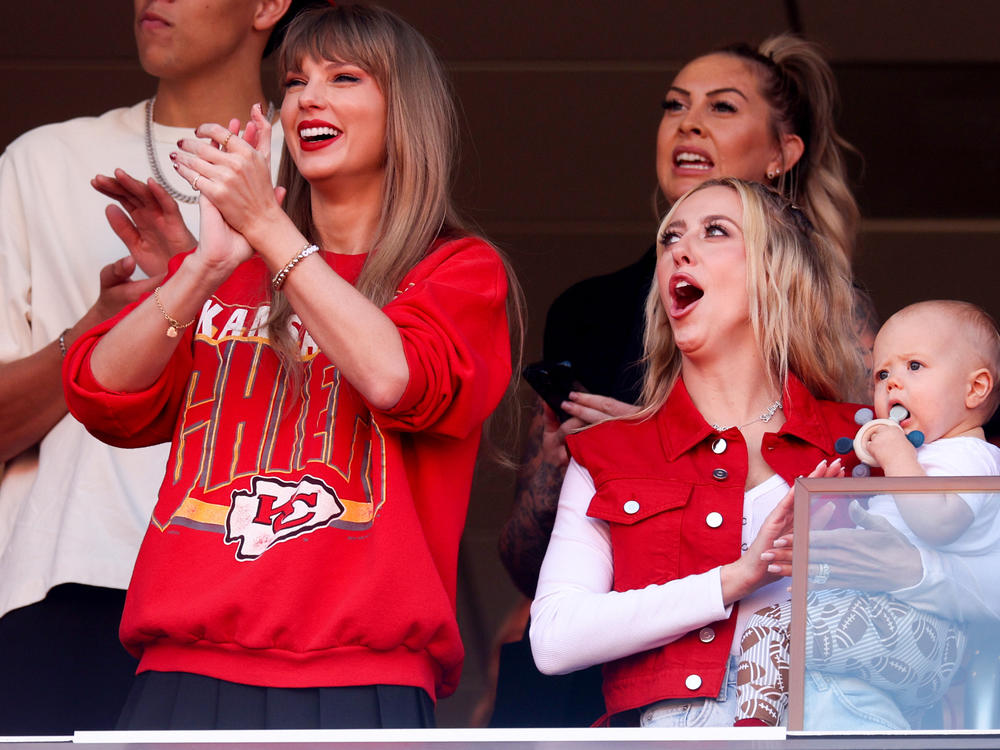Section Branding
Header Content
From Swiftie beads to Barbie and Beyoncé, girls ran the world economy in 2023
Primary Content
If the 21st century does belong to women, then 2023 might stand out as the year when girls unleashed their economic power.
Female spending became a powerful force this year, impacting the economies of cities and entire countries. In May, Beyoncé single-handedly raised inflation in Sweden when adoring fans from all over showed up for the kickoff of her Renaissance World Tour, sending prices of hotel rooms and restaurant meals, among other things, skyrocketing.
Danske Bank Chief Economist Michael Grahn said it led to a bump up in Sweden's inflation in May. "It's quite astonishing for a single event. We haven't seen this before," Grahn told the Financial Times.
Girl spending also made history in the box office: As hordes of young women dressed in pink descended on theaters to watch Barbie, they catapulted the movie into the highest grossing film of the year in the U.S. and worldwide. The film was a Warner Bros. box office record, toppling a Harry Potter movie, as the studio's biggest theatrical hit ever.
We found out that when girls open their wallets, economies roar. Even the Federal Reserve noted their economic prowess.
Mad bump in sales at Michaels stores from Taylor Swift friendship bracelet craze
As they maximized their experiences, women lifted all sorts of businesses, and it wasn't just hot dog stands or hotels in and around the venues.
When Beyoncé requested her fans to come donned in silver for her show — "we'll surround ourselves in a shimmering human disco ball each night" — it fueled a mad rush for shiny outfits and doodads. Small businesses on Etsy that sell silver, chrome and sequins saw their sales skyrocket.
One paint company sold out of its hot pink shade after it was used up for the Barbieland set in the movie. And fans paid homage to Taylor Swift's lyrics — "So make the friendship bracelets" — by hand making them for the Eras tour and posting photos on social media. Michaels Stores experienced a 300% jump in sales of beads and jewelry in the days leading up to the concert at her tour stops, with a dramatic 500% increase in Pennsylvania when she performed in Philadelphia and Pittsburgh.
"It's a testament to the female purchasing power," said Ed Tiryakian, professor of finance and business economics at Duke University.
In a year when female spending led the way, the Taylor Swift phenomenon topped the trend. Her Eras tour became the first in history to surpass $1 billion in revenue, before she had reached the halfway mark of her 151 shows globally. The tour continues in 2024, with most of the shows that have been announced overseas, except for a handful in the U.S.
"If every Taylor Swift concert is like a Super Bowl, then by the end of her 151 concerts, the total economic impact will be around $75 billion," said Tiryakian.
The girls can spend
Swifties, as her fans are called, are known to spend big. Her show in Glendale, Ariz., generated more revenue for the city's businesses than the 2023 Super Bowl, which was held in the same stadium.
The U.S. Travel Association said her impact on local economies is "unprecedented" because of her fans' insatiable demand and willingness to travel to her concerts. The organization said Swifties spend $1,300 on average per person in local economies on travel, hotel stays, food, as well as merchandise and costumes.
The effect extends beyond her own shows. When Swift started dating Kansas City Chiefs football star Travis Kelce, his games suddenly started seeing a massive increase in viewership. Notably, it spiked 53% among teen girls age 12-17 when Swift showed up to one of the games.
The Kansas City Star reported that StubHub, the ticket-resale platform, "has seen a nearly three-fold increase in ticket sales and ticket searches for all Chiefs home games for the rest of the season."
Academics are noticing. Universities from Harvard to University of Texas are offering courses on Swift. UC Berkeley has an entrepreneurship class at its business school and University of Delaware an economics course based on her career.
World leaders begged Taylor Swift to perform in their countries
World leaders are eager to get in on the Swift economy.
Canada's Prime Minister Justin Trudeau said in a social media post: "I know places in Canada would love to have you...We hope to see you soon."
Chilean President Gabriel Boric, a self-proclaimed Swiftie, shared in a YouTube video that he reached out to Swift. "I wrote to her not too long ago, let's see if she responds, so that one day she can include us in her Latin America tour."
One Australian politician took it to a new level, even groveling for Swift to come. "I'm asking you, I'm begging you, I'm pleading with you, I'll get down on my knees if I have to, please come to Queensland," member of Parliament and former House Speaker Andrew Wallace said.
Time to reassess an economic powerhouse
Beyoncé's tour has been devoted to honoring Black and LGBTQ+ communities. It has inspired attendees to shop at Black-owned companies, giving them a "Beyoncé bump."
Her Renaissance World tour has led some to reassess the economic power of her large Black female fanbase. Not only did they and other fans spend vast amounts of money to buy the tickets, but also on flights and hotels, to see the Queen Bey perform.
According to The New York Times, Beyoncé 's tour generated an estimated $4.5 billion for the American economy, about as much as the 2008 Olympics did for Beijing.
This economic power is only set to grow
Driving all of this spending is the fact that women are doing well, as more of them are working. This year, the share of American women working hit a record high.
Moreover, urban younger women are doing well. Women under the age of 30 are out-earning or making the same amount as their male counterparts in 22 major metros, according to a Pew Research Center analysis of Census Bureau data, even though women overall nationwide earn less than men.
Not only are there a lot more women enrolled in college than men, more of them are likely to graduate. Among younger adults between the ages of 25 to 34, women outpace men with a college degree by a wide margin.
Is there more to be done? You bet
Of course, women continue to face bias and are demeaned and dismissed in many spheres. They are twice as likely to be mistaken for someone junior and hear comments on their emotional state, and these can have a large and lasting impact.
Women still haven't broken many glass ceilings. The top 500 American companies have just 10% female CEOs. There is a persistent underrepresentation of women of color in higher echelons of powerful organizations.
But as the data shows, they're making big strides. And, when possible, women are making the choice to spend their money on once-in-a-lifetime experiences, like the Beyoncé and Swift concerts, or opportunities to hang out with their besties, their daughters and grand daughters to watch a girl movie.
Many are also making big purchases, like homes — single women made up 19% of all homebuyers this year. It is remarkable, given that until the 1970s, they needed a man as a co-signer.
While there are gaps that still need to be traversed, for now, girls can revel in the knowledge that the power of their purse shook up economies around the world.
Copyright 2023 NPR. To see more, visit https://www.npr.org.



